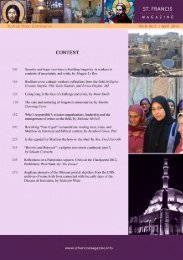download the pdf - St.Francis Magazine
download the pdf - St.Francis Magazine
download the pdf - St.Francis Magazine
You also want an ePaper? Increase the reach of your titles
YUMPU automatically turns print PDFs into web optimized ePapers that Google loves.
<strong>St</strong> <strong>Francis</strong> <strong>Magazine</strong> Vol 8, No 4 | August 2012<br />
stan have fur<strong>the</strong>r complicated matters by causing resentment against<br />
<strong>the</strong> “Christian” West and, by association, against local Christians.<br />
Christians in <strong>the</strong> region may thus be tarred with a triple brush: as<br />
sweepers, as infidels and as traitors. This collective identity has an<br />
important bearing on conversion.<br />
4.2 Conversion from Christianity to Islam<br />
Christian literature celebrates conversion from Islam but rarely mentions<br />
conversion to Islam. In Muslim writings, <strong>the</strong> same is true in<br />
reverse. 79<br />
Yet historically far more people from Christian communities have<br />
converted to Islam than vice-versa. This fact is not only honest to<br />
acknowledge, but of missiological relevance in places like Islampur<br />
where historic Christian communities survive in Muslim contexts.<br />
Fur<strong>the</strong>rmore, evangelists now planting first-generation churches in<br />
Muslim countries would do well to heed lessons of history which are<br />
liable to played out in <strong>the</strong>ir context too in future generations.<br />
4.2.1 An historical perspective<br />
Why did Christians 80 under centuries of Muslim rule convert to Islam<br />
Factors varied from period to period and from region to region,<br />
which is why specific historical studies in specific contexts are important.<br />
81 Different factors held sway to different extents and in different<br />
combinations, according to <strong>the</strong> specific context.<br />
79 There are occasional exceptions. Among Christian researchers <strong>the</strong>re is Andreas<br />
Maurer, who compared <strong>the</strong> conversion narratives of ten converts from Christianity<br />
to Islam with ten in <strong>the</strong> o<strong>the</strong>r direction. See ‘In Search of a New Life: conversion<br />
motives of Christians and Muslims’, in David Greenlee (ed.), From <strong>the</strong> <strong>St</strong>raight Path<br />
to <strong>the</strong> Narrow Way, (Milton Keynes, UK: Au<strong>the</strong>ntic, 2005), 93-108. A rare example<br />
from Muslim authors is Mohammad Khalil & Bilici Mucahit, ‘Conversion out of Islam:<br />
A <strong>St</strong>udy of Conversion Narratives of Former Muslims’. The Muslim World<br />
(2007) 97:11-124.<br />
80 I use <strong>the</strong> term “Christian” here as a descriptive label for any individual born into a<br />
community which calls itself Christian. Only some of those, whe<strong>the</strong>r today or in<br />
times past, are active followers of Jesus.<br />
81 Philip Jenkins has shown how conversion to Islam, emigration and occasional<br />
ethnic cleansing left <strong>the</strong> once-predominant Eastern churches a mere remnant of <strong>the</strong>ir<br />
former glory. See Philip Jenkins, The Lost History of Christianity, (New York:<br />
<strong>St</strong> <strong>Francis</strong> <strong>Magazine</strong> is a publication of Interserve and Arab Vision 538







![Reflections on Surah Fatiha and the Lord's Prayer[1] - St.Francis ...](https://img.yumpu.com/49377951/1/184x260/reflections-on-surah-fatiha-and-the-lords-prayer1-stfrancis-.jpg?quality=85)









